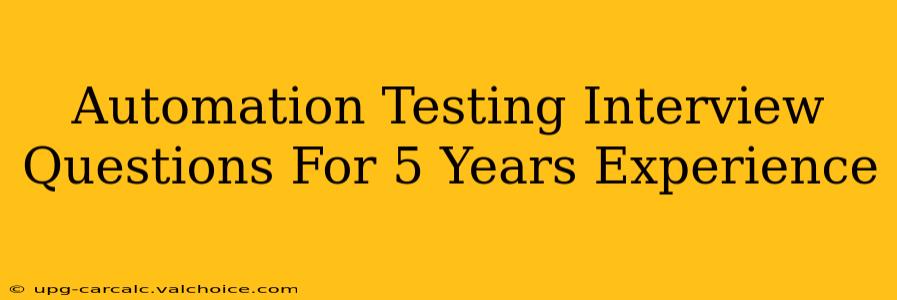This article provides a comprehensive list of automation testing interview questions tailored for candidates with five years of experience. These questions cover a wide range of topics, from fundamental concepts to advanced strategies and problem-solving scenarios. We'll delve into both technical skills and soft skills essential for success in an automation testing role.
Fundamental Concepts & Frameworks
These questions assess your understanding of core automation principles and popular frameworks.
1. What are the key differences between UI, API, and Database testing, and when would you choose each?
This question probes your understanding of different testing layers and their applications. A strong answer will detail the strengths and weaknesses of each approach, explain the types of defects each uncovers, and illustrate scenarios where one is preferable over others.
2. Explain your experience with different automation frameworks (e.g., Keyword-Driven, Data-Driven, Hybrid, BDD). Provide specific examples of when you used each.
This tests your practical experience. Be prepared to discuss specific projects where you implemented these frameworks, highlighting the advantages and challenges you encountered. Mention specific tools used within each framework (e.g., Selenium with Java for Keyword-Driven, Cucumber for BDD).
3. Describe your experience with Selenium WebDriver. What are its limitations, and how have you overcome them?
Selenium is a cornerstone of UI automation. The interviewer wants to know your proficiency and problem-solving abilities. Mention specific challenges (e.g., handling dynamic elements, dealing with iFrames, managing waits) and how you addressed them using techniques like explicit/implicit waits, JavaScript executors, or other strategies.
4. Compare and contrast different test automation tools you've used (e.g., Selenium, Appium, Cypress, RestAssured).
This showcases your breadth of experience. Focus on the strengths and weaknesses of each tool in relation to specific testing types (web, mobile, API) and the scenarios where one would be a better choice than another.
Advanced Concepts and Problem Solving
These questions assess your ability to handle complex situations and apply advanced techniques.
5. How would you approach automating tests for a complex application with multiple dependencies and asynchronous operations?
This is a crucial question. Demonstrate your understanding of strategies like mocking, stubbing, and the use of message queues or other techniques to manage dependencies and asynchronous behavior. Discuss how you would handle wait times and error handling effectively.
6. Describe a challenging automation problem you faced and how you solved it. What did you learn from this experience?
This assesses your problem-solving abilities and learning agility. Choose a real-world example that highlights your analytical skills and demonstrates your ability to persevere. Emphasize the steps you took, the tools you used, and what you learned from the experience.
7. How do you handle flaky tests? What strategies do you employ to improve test stability?
Flaky tests are a common pain point. Your response should highlight your proactive approach to identifying and addressing flakiness, including techniques like improving locators, implementing proper waits, optimizing test data, and using retry mechanisms.
8. Explain your experience with CI/CD pipelines and how you integrate automated tests into them.
Demonstrate your understanding of the CI/CD process and your role in integrating automated tests within this pipeline. Mention specific tools (e.g., Jenkins, GitLab CI, Azure DevOps) and discuss best practices for triggering tests, reporting results, and integrating with other pipeline stages.
Soft Skills and Professionalism
These questions assess your teamwork and communication skills.
9. Describe your experience working within an Agile team. How do you contribute to the team's success?
Highlight your collaboration skills and your understanding of Agile principles. Discuss your contributions to sprint planning, daily stand-ups, and retrospectives.
10. How do you prioritize testing tasks, especially when facing tight deadlines?
This evaluates your ability to manage workload effectively. Explain your approach to prioritizing tests based on risk, criticality, and business value.
11. How do you stay up-to-date with the latest advancements in automation testing?
This demonstrates your commitment to continuous learning. Mention specific resources you use (e.g., blogs, conferences, online courses) and your proactive approach to skill development.
By preparing thoughtful answers to these questions, you’ll significantly improve your chances of success in your automation testing interview. Remember to tailor your answers to your specific experiences and highlight your accomplishments. Good luck!

